Goodwin Liu & Laurie L. Patton
Induction is one of our most cherished events of the year. It is a time to honor and celebrate the achievements of our newest members, recognizing their excellence in all fields and disciplines. At this year’s Induction, we welcomed over 200 of the 250 members elected in 2024, marking the largest single class Induction in our history. It was our privilege to participate fully in the weekend’s activities, to meet the new members and their families, and to inspire this new class to be engaged in the work of the Academy.
On December 31, Laurie will be leaving her role as the president of Middlebury College and will begin as the Academy’s president in January. Laurie is a scholar of South Asian history, culture, and religion, and was elected to the Academy in 2018 in the study of religion and in educational leadership.
Since our founding in 1780, the Academy’s mission “to cultivate every art and science which may tend to advance the interest, honor, dignity, and happiness of a free, independent, and virtuous people” has guided our institution. However, like our nation, the Academy has reflected the struggles and contradictions of its time. Our first president, James Bowdoin, was an advocate of independence yet also a slaveholder, as was his Academy colleague Thomas Jefferson. The Academy elected its first African American member, diplomat Ralph Bunche, in 1951, and its first woman, astronomer Maria Mitchell, in 1848. It would take nearly a century for the Academy to elect another woman.
Four years ago, the Academy’s Board adopted a Statement on Anti-Racism that calls on us not only to examine our own history, but also to help undo the injustices of the past. During the Induction weekend in September, we announced the inaugural class of Legacy Recognition Honorees, a new initiative to recognize individuals whose outstanding accomplishments have been overlooked or undervalued during their lifetimes. We recognized forty remarkable individuals: scholars, researchers, writers, artists, advocates, and community leaders. We are grateful to the scores of members from across the country who participated in this new initiative by either submitting or supporting a nomination.
We are also grateful to the many members who participated in our membership election process this year: 814 members submitted nominations, over 51 percent (2,757) voted, and a dedicated group of 267 members served on class committees, section panels, and canvass committees. The remarkable talent and diversity reflected in our new members are a testament to the efforts of current members and demonstrate what social science already tells us: that diversity of thought and experience drives excellence.
This year was a busy one for Academy projects and commissions. We issued major reports from the Commission on Accelerating Climate Action and the Commission on Reimagining Our Economy (CORE), with outreach to connect the work with key audiences. Members of the Climate Commission met with the U.S. Environmental Protection Agency, White House Office of Science and Technology Policy, thirty-five congressional offices (of both parties), and the National Governors Association. Meanwhile, members of CORE briefed eight of the twelve regional Federal Reserve Banks, Democratic and Republican lawmakers and staff in the House of Representatives and Senate, and state officials across the country. We also continued our democracy work, advancing the ideas in the Our Common Purpose report, which helped pave the way for the launch of the Trust for Civic Life, a new philanthropic initiative supporting rural programs that strengthen community bonds, civic engagement, and everyday democracy.
In June, the Academy convened its annual Forum on Higher Education. More than one hundred higher education experts and leaders, including university presidents, provosts, and academic deans from many of the Academy’s Affiliate institutions, met in Aspen, CO, to discuss the future of work and preparation for the job market, speech on campus and beyond, the changing political landscape, and artificial intelligence in our world.
In the area of global security, the Academy partnered with the Shanghai Academy of Social Sciences and the Project on Managing the Atom at Harvard Kennedy School to convene a U.S.-China Track II dialogue. The dialogue, held in Shanghai in May, included thirty U.S. and Chinese experts, former senior officials, and leading scholars on arms control. And our ongoing work on the Humanities Indicators continues to serve as an important resource for media and scholarly discussions on the state of the humanities. The Indicators were cited by major media outlets, referenced in numerous books published in 2024, and discussed at several national conferences.
Our journal Dædalus had a noteworthy year, publishing issues on implicit bias, international higher education, free speech, and educational equity. The reach of the journal has expanded significantly since it became open access in 2021, with more than a threefold increase in downloaded essays and online readership.
None of what the Academy has done would be possible without the generous support of our members. We are grateful to those who support our annual fund and those who direct additional contributions toward special areas of impact. During the past fiscal year, we received $12.5 million in gifts and pledges. Your confidence in the Academy fills us with optimism for the future.
As we look ahead to 2025, we are excited to work together and with our members to fulfill the Academy’s mission of advancing the common good, and to ensuring that the Academy remains both relevant and impactful in strengthening democracy through its thought leadership. And we are thrilled to begin a new chapter of the Academy with Laurie’s leadership as our president.
Goodwin Liu & Laurie L. Patton
